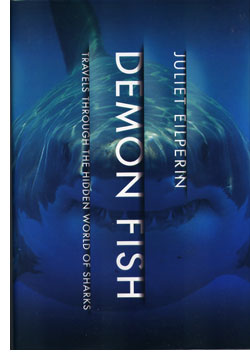 |
 |
 Juliet Eilperin
Juliet Eilperin
Demon Fish: Travels Through the Hidden World of Sharks
Reviewed by: Rick Kleffel © 2011
Pantheon / Random House
US Hardcover First Edition
ISBN 978-0-375-42512-7
Publication Date: 06-14-2011
296 Pages ; $24
Date Reviewed: 08-21-2011
Index:
Non-Fiction
So much has been written about sharks that one might begin to wonder if new information about them is as threatened as the species itself. How many times can we terrorize ourselves with tales of bloody mayhem? How many life cycles can we ride? When every week is "Shark Week," what makes one week different from the next?
Juliet Eilperin's book 'Demon Fish: Travels Through the Hidden World of Sharks,' steps far enough back from the subject to get to the heart of the real question. Why are humans are so fascinated with sharks that we're bringing them to the brink of extinction? Sharks play a central role in this book, but it is the humans who study them, eat them, even call them that are the subject of 'Demon Fish.' Eilperin finds a fresh take on sharks by addressing the human side of the equation. Her exploration of how humanity looks at, lives with and preys upon the world's most ancient predator gives readers a nuanced vision of our relationship with not just sharks, but own nature as well as nature itself.
Eilperin's book is straightforward and unpretentious. Starting with her own experience at The Shark Lab, she then sets forth to explore the world via sharks and shark culture. We meet the Shark Callers of New Ireland, and journey back in time to explore the history of sharks and their interactions with humans. Worshipped as gods, feared as monsters, harvested as food, sometimes by the same people, a look at shark culture proves to be a pretty entertaining method of exploring the world.
Eilperin's prose and sense of journalistic pacing are excellent. The book is divided into a series of chapters, each of which explores a different aspect of our relationship with these ancient creatures. She manages to put a lot of things into perspective, pointing out, for example, that sharks are older than dinosaurs. The implication then, is that sharks survived whatever it was that wiped out the dinosaurs, even as we manage to bring them to the edge of extinction. She takes on the pointlessness behind the slaughter of sharks for shark fin soup.
Eilperin knows that readers need characters to bring together a book, and she's adept at creating them even in her episodic format. From Selam Karasimbe, the world's most famous shark caller to "Mark the Shark" Quartiano, who specializes in fishing for and killing sharks to marine biologist Steve Palumbi to shark tracker Ellen Pikitch, Eilperin reaches beyond the cultural and into the personal lives of humans and sharks. Her even-handed approach ensures that we never feel as we're being preached to. Instead we see the world through the eyes of her characters.
Eilperin is smart enough to know that readers love to read about reading, so she gives us a nice history of shark lit and movie lore. You even get a section of color plates in the middle of the book that includes Bruce the mechanical shark from the movie Jaws. 'Demon Fish' does give readers a good dose of lore about the creatures themselves, of course, given that it looks so closely at those studying them. This is a book about more than the ocean's deadliest predator. 'Demon Fish' is engrossing and entertaining, but Juliet Eilperin makes it perfectly clear who the real predator is, and the potential downside of our unfettered killing spree.
|
 |
|
|
 |
| |
Review Archive
All Reviews alphabetized by author.
General Fiction
Non-Genre, general fiction and literature.
Horror
Supernatural fiction, supernatural horror and non-supernatural horror.
Science Fiction
Science fiction, science fantasy, speculative fiction, alternate history.
Fantasy
Fantasy, surrealism and magic realism.
Mystery
Crime, thrillers, mystery, suspense.
Non-Fiction
Non-Fiction, True Crime, Forteana, Reference.
Poetry
|
|
 |
|




